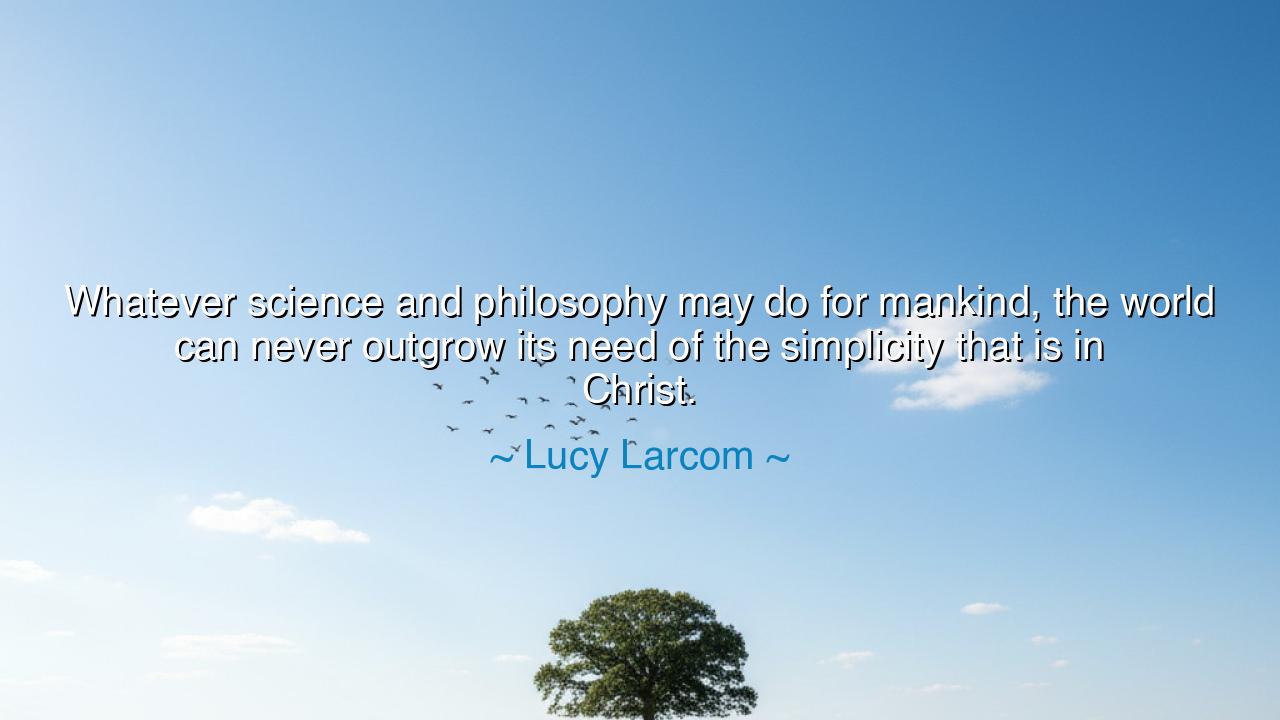
Whatever science and philosophy may do for mankind, the world can
Whatever science and philosophy may do for mankind, the world can never outgrow its need of the simplicity that is in Christ.






Hear, O children of the future, the powerful words of Lucy Larcom, who spoke thus: "Whatever science and philosophy may do for mankind, the world can never outgrow its need of the simplicity that is in Christ." In these words, we are reminded of a timeless truth—that no matter how far human understanding stretches, no matter how great our advancements in science and philosophy, the world will always yearn for the simplicity, the humility, and the grace that is found in the teachings of Christ. These are not mere words but a profound lesson in the eternal nature of truth and wisdom, qualities that transcend the complexities of the world and speak directly to the heart of human experience.
In the days of the ancient philosophers, men like Socrates, Plato, and Aristotle sought to understand the very fabric of existence. They delved into the mysteries of the universe, probing the depths of reason and ethics, striving to unravel the complexities of the human soul and the world around them. Their contributions to philosophy were vast, and the impact of their thoughts has echoed through the ages. Yet, even in their deepest musings, they never reached the simplicity that Christ offers. For while science and philosophy seek to understand the world, Christ's teachings offer a simplicity that transforms lives not through intellectual pursuit, but through the heart. This is the message that Larcom imparts to us—there is a simplicity in Christ that cannot be matched by the complexity of human intellect.
Consider the example of Albert Einstein, a man whose contributions to science are monumental. His theories of relativity and his exploration of the universe's fundamental laws have forever changed the way we understand the cosmos. Yet, in his later years, he spoke of the simplicity he found in the mysteries of the universe. He understood that the greatest truths of existence were not to be found in complex equations or intellectual debates, but in the humble recognition of something far greater than ourselves. In his heart, Einstein knew that no matter how advanced our understanding of the world, there would always be a need for simplicity—a simplicity that can be found in the teachings of love, compassion, and grace that Christ embodied.
Christ, whose life and teachings transcended the confines of time and space, showed us that the deepest truths are often the simplest. His message was not one of intellectual prowess or philosophical complexity, but one of love, forgiveness, and compassion. He spoke to the poor, the downtrodden, and the forgotten with words that were simple yet powerful, that spoke directly to the heart. The simplicity of Christ's message is not a denial of the complexities of the world, but a reminder that at the core of all human existence lies a simple truth: love one another, as He loved us. This is the simplicity that Larcom speaks of—the simplicity that remains unshaken by the passing winds of time, the simplicity that is rooted in the eternal nature of human dignity.
As we move forward into the future, children of wisdom, let us remember that the advancements we make in science and philosophy are not ends in themselves, but tools to help us better understand the world and, ultimately, ourselves. These fields offer us knowledge, yes, but they also remind us of our limitations. The more we know, the more we recognize how little we truly understand. And it is in these moments of recognition, when our minds are overwhelmed by the vastness of the universe, that we find solace in the simplicity of Christ's message. No matter how much we achieve, no matter how far our knowledge stretches, we will always need the simplicity of love, humility, and grace to guide our hearts.
Take, then, this lesson into your lives: Seek knowledge, yes, but do not allow it to cloud the simple truths that can transform your heart and the world around you. In your quest for understanding, remember that the greatest truth is often the simplest—love one another, as Christ taught. As you venture into the fields of science, philosophy, and technology, never forget that true progress is not measured by complexity, but by the depth of your compassion, the clarity of your purpose, and the simplicity of your actions. The world may never outgrow its need for Christ's simplicity, and neither should you. For in that simplicity lies the deepest wisdom of all.






AAdministratorAdministrator
Welcome, honored guests. Please leave a comment, we will respond soon